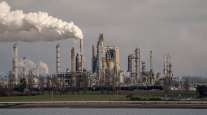Oil Jumps After Saudi Arabia Raises Prices to Boost Recovery

[Ensure you have all the info you need in these unprecedented times. Subscribe now.]
Oil surged after Saudi Arabia raised prices for its crude globally.
Futures in London added as much as 7.1%, moving beyond $31 a barrel, while U.S. crude rose 11%. State-run Saudi Aramco, which earlier this year initiated a war by offering massive discounts on its crude, raised prices on almost all grades for June. The move comes as the kingdom and its OPEC+ partners embark on record production cuts in a bid to balance a glutted market.
“The higher prices by Aramco suggest a recovery of demand,” said Hans van Cleef, senior energy economist at ABN Amro.

The OPEC+ coalition that includes Russia started implementing output cuts of 9.7 million barrels a day this month. The move follows a record buildup in inventories as demand was ravaged by the coronavirus outbreak that has seen oil tanks filling up globally. There have been tentative signs from China to Germany to Florida that demand for fuel — particularly gasoline — is starting to pick up.
Some of the biggest moves in Saudi oil pricing came for refiners in Europe and the Mediterranean, also the main market for Russian crude. It’s possibly a sign that the price and market-share wars are easing after Riyadh and Moscow agreed last month to work together again as part of the OPEC+ alliance. Prices in those regions were hiked by between $5.80 and $7.50 for June, according to the price list.
“The price increase suggests Saudi Arabia will not just cut their production as part of the OPEC deal, but also reduce their crude exports by making them more expensive,” said Giovanni Staunovo, commodity analyst at UBS Group AG.
Want more news? Listen to today's daily briefing:




